|
|
Posted 6/1/2015 (link)
 Here's a recent video addition to the PennSound archives: Steve McCaffery's performance of "The White Pages" and other selected works at the Burchfield Penny Art Center in Buffalo, NY on January 14, 2003. PennSound's Steve McCaffery author page is also home to another recording of "The White Pages," made nearly thirty years earlier as part of a Segue Series set at the Ear Inn on January 11, 1985.
Our archive of McCaffery recordings goes back as far a pair of 1979 Segue Series recording, also at the Ear Inn — one featuring solo pieces and performances with fellow members of the Four Horsemen, Paul Dutton and Rafael Barreto-Rivera; the other a group reading for the collaborative book project, Six Fillious — while Four Horsemen readings featuring McCaffery are available from as early as 1973. Our most recent recording of the poet is from last year's EPC@20 Celebration.
Posted 6/3/2015 (link)
 We've just posted three new Cross Cultural Poetics programs from this past spring, all of which were taped on April 2nd on KAOS-FM, the Evergreen State College's radio station. Here's a rundown of the latest guests to chat with host Leonard Schwartz:
First, in episode #329, "Khirbet Khizeh," Nicholas de Lange talks about and reads from Israeli novelist S. Yizhar's 1949 novel of the same name, which he co-translated from the Hebrew with Yaacob Dweck. That's followed by episode #330, "Address," which begins with Elizabeth Willis reading from and discussing Address, her latest volume from Weslyan University Press. She's followed by Caroline Bergvall (shown at right) who reads from Drift, her latest from Nightboat Books. Finally, in episode #331, "Drift," Bergvall, on the phone from London, returns for a more in-depth discussion of Drift.
You can listen to all of these programs, as well as the previous 328 on PennSound's Cross Cultural Poetics series page, and stay tuned for more fantastic shows in the fall.
Posted 6/5/2015 (link)
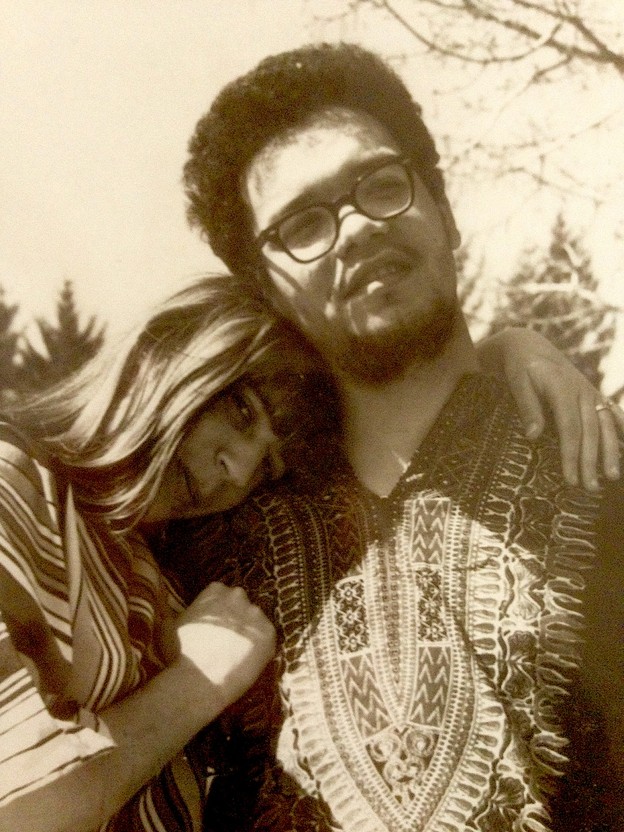 Our latest PennSound Podcast, number forty-nine in the series, features a long conversation between Al Filreis and William J. Harris — well known for his critical work on Amiri Baraka and the recently co-edited (with Kyle Waugh) Jacket2 tribute feature on Kenneth Irby — and features a long written introduction by Harris himself, as well as a number of wonderful photos (including the one at right of Billy Joe and Susan Harris in 1969). Here's how his write-up kicks off:
This interview tracks my genesis and early development as a poet and intellectual. My artistic and cultural education occurs during the late 50s, the 60s and the early 70s and takes place primarily in and around academic institutions: the liberal college, Antioch, which is in my hometown of Yellow Springs, Ohio, and the nearby black state university, Central State, in Wilberforce, and the story, if not exactly concluding, comes to "a momentary stay against confusion" at Stanford University in Northern California where I did my MA in creative writing and a PhD in English.
My main education came mostly from students, not professors, because the students were in contact with what was happening in the culture. This was the time of the New American Poetry, the postwar avant-garde movement, and free jazz, the radical new black music. Even though I was not a student there the students at Antioch and what I read there taught me about the New American Poetry and at Central I learned a little about free jazz. Well, heard it anyway. Listening to it with a group of black militant students, I found it incoherent; they didn't. It would take me years to make sense of it.
You can read more, and listen to this luxuriously long and fascinating conversation — eighty-two minutes in length — here.
Posted 6/8/2015 (link)
 Our latest PennSound author page is for Brooklyn-based poet and Wall Street Journal editor Michael Ruby, and is anchored by a pair of recordings made a decade apart.
The more recent of these was made in 2014 and includes all seventy-five poems from Ruby's latest collection, American Songbook (Ugly Duckling Presse, 2013), whose "poems are based on 75 recordings, with singers ranging from Bessie Smith to Tupac Shakur, and songs from a little-known Lomax prison recording to the last No.1 pop hit in the century." The UDP write up continues, noting "Many musical traditions inform the poems, including blues, jazz, gospel, country, folk, bluegrass, electric blues, R&B, rock, disco and hip hop." Among pieces such as "You Keep Me Hangin' On," "What a Wonderful World," "Billie Jean," "Coal Miner's Daughter," "Folsom Prison Blues," and "Hot Stuff," readers and listeners are certain to find some sort of cultural touchstone that draws them into the overarching project.
Jumping back to May 2004, our second recording comes from Radio Poetique's Poetic Brooklyn and includes seven tracks altogether, including "Among the Crepusculars," "Only on Tuesday," "First Names," and "Among Senses."
Posted 6/11/2015 (link)
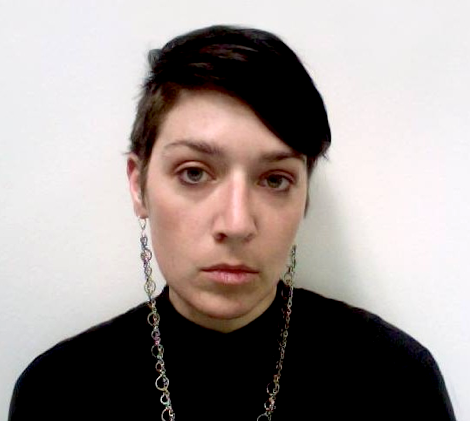 Our recent cavalcade of new PennSound Podcasts continues with episode #50, in which Gabriel Ojeda-Sague Interviews Emji Spero.
Emji Spero, an Oakland-based artist and poet exploring the intersections of writing, book art, installation, and performance, visited Philadelphia and the Kelly Writers House in April 2015 to talk about their book almost any shit will do, which uses found language from mycelial studies, word-replacement, and erasure to map the boundaries of collective engagement. Spero is a cofounder and editor of the "art-cult" Timeless, Infinite Light and has described their books as "spells for unraveling capitalism."
In this interview at the Wexler Studio, Spero spoke with Gabriel Ojeda-Sague, a poet living in Philadelphia and author of the chapbooks JOGS (Lulu, 2013) and Nite [chickadee]'s (forthcoming GaussPDF), about personal trauma, queer longing, surveillance states, public/private access, the Baltimore riots, and a new work on violence as the static and quotidian. The interview concludes with a ten-minute collaborative reading by both poets from almost any shit will do.
Posted 6/13/2015 (link)
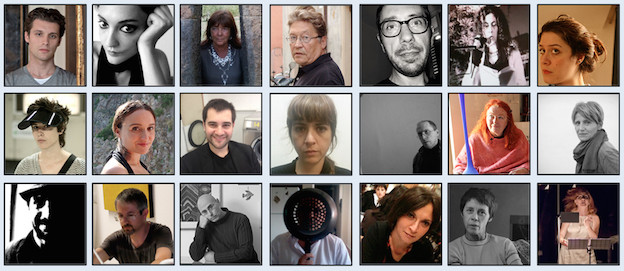 Here's a tremendously exciting new addition to the PennSound archives: PennSound Italiana, curated by Jennifer Scappettone, which brings together audio and video recordings from twenty-one contemporary Italian poets. Concurrent with its launch today, Jacket2 has published Scappettone's introduction to the collection and a tour of several highlights. Here's how she begins:
We seek over the course of this ongoing project to offer a broad sense of the field, filling in the substantive gaps in global access to Italian poetry (as both written and sonic text — even within Italian borders), and expanding awareness of its range of practitioners, with an emphasis on marginalized and experimental voices of the twentieth and twenty-first centuries. It is an effort — a unique one, in our reckoning — to "liberate" the spectrum of Italian poetry for as broad a public as possible through audio and video recordings, given that the publishing industry and the translation market are endangered and/or blinkered enough to condemn a significant swath of both historical and contemporary innovation to oblivion. As such, this live archive extends the task of PennSound writ large.
While the initial offerings are more than impressive on their own, Scappettone also reports that she's already at work gathering subsequent additions to the collection. While it's perhaps inevitable that PennSound is first and foremost a living document of modern and contemporary American poetry, we also take great pride in being able to share a wide variety of work from outside our borders, and PennSound Italiana is a fine example of that dedication. We're particularly grateful to Jennifer Scappettone for her hard work on this project and hope our listeners will enjoy it as much as we have.
Posted 6/17/2015 (link)
 While we're still gathering information on this recording, it's simply too good to not announce to our listeners: our brand new Mina Loy author page contains a ninety-minute recording, made near the end of her life in 1960, which is, as far as we know, the only known recording of the legendary poet and artist.
Better still, Loy's interviewee for this long, charming conversation and reading is the equally-legendary Paul Blackburn, as fine an interlocutor as one might hope for. Joan Blackburn informs us that the third voice in the recording belongs to poet and publisher Robert Vas Dias.
We're grateful to Joan Blackburn and Roger Conover (Loy's editor and literary executor) for their permission to present this historic recording, as well as to Douglas Storm who provided us with a copy.
Posted 6/22/2015 (link)
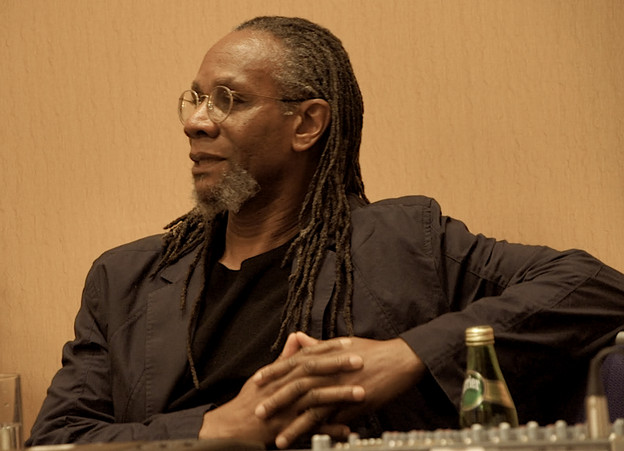 We recently launched the eighty-ninth program in the PoemTalk Podcast series, which is concerned with Nathaniel Mackey's poem "Day after Day of the Dead," which can be found in the poet's latest Nod House (New Directions, 2011). Joining host Al Filreis for this program are Tsitsi Jaji, Herman Beavers, and William J. Harris.
After providing some contextual background on the poem, Filreis' write-up on the PoemTalk blog moves into the panelists' avenues into addressing the poem: "Tsitsi comments on the appearance and also the disappearance of the 'we.' Billy Joe reads 'we' as lovers, at points, but wonders what traumatic break this 'we' has endured here. Disaster of some sort. A flood? (Tsitsi mentions New Orleans.) An attack? (There are references to the 2004 Madrid bombings earlier in the book.) Herman suggests that the collective journey could remind one of the Middle Passage. This for him partly explains why the ensemble in the poem no longer wants to know what soul was. 'You actually try to forget what soul is,' Herman offers, 'so it cannot be taken from you.' All agree that the speaker and his cohort or 'philosophical posse' are survivors of some sort, and that the poem is marked by the effort at witnessing and testifying to others' deaths and (for the speaker and his colleagues) one's own near-death. They eat with great appetite — glad to be bodies, glad to be alive — yet the repast is morbid ('knucklebone soufflé is on the menu)." You can read more about the program on Jacket2.
PoemTalk is a co-production of PennSound, the Kelly Writers House, Jacket2 and the Poetry Foundation. If you're interested in more information on the series or want to hear our archives of previous episodes, please visit the PoemTalk blog, and don't forget that you can subscribe to the series through the iTunes music store.
Posted 6/26/2015 (link)
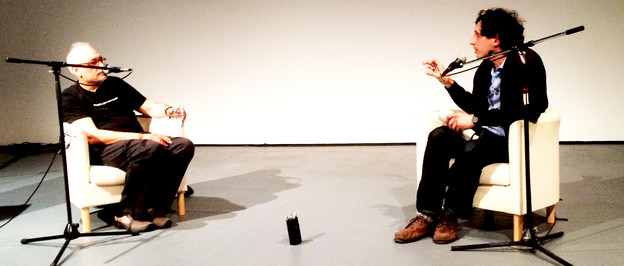 The latest program in Charles Bernstein's radio series Close Listening was recently released, and features a unique spin on the show's conventional format. Here's Bernstein's description from his Jacket2 commentary page:
Whitney Museum curator of performance Jay Sanders and poet Charles Bernstein discuss their work in, on, and around sound, performance, installation, dance, poetry, theater, poetics, curating, editing, and essay writing. They also reflect on their previous collaboration curating the 2001 exhibition Poetry Plastique at the Marianne Boesky Gallery. This event was organized as part of the exhibition S/N, curated by the 2014–15 Helena Rubinstein Curatorial Fellows of the Independent Study Program. The event took place at The Kitchen in New York.
Before the two Close Listening shows, Sanders and Bernstein each read essays. Bernstein read his preface to Pitch of Poetry and discussed his work with audio-tape poems. Sanders followed his essay by playing a track of Colin Nancarrow, as a preview of a show he co-curated, "Anywhere in Time: A Conlon Nancarrow Festival." In the interview, Sanders also discussed his show "Rituals of Rented Island: Object Theater, Loft Performance, and the New Psychodrama."
To listen, click the title above.
Posted 6/29/2015 (link)
 Here's a recent addition to our Stephen Ratcliffe author page: an October 2, 2014 reading celebrating the poet's Selected Days (Counterpath, 2012) winning the San Francisco State University Poetry Center's Book Award.
The incomplete recording, which runs a little less than an hour, begins with an introduction by Poetry Center Director Steve Dickison, in which he shares the excerpts from the anonymous judge's statement, which begins as follows: "Like a core sample drilled down through the days, these Selected Days come up with layered and differentiated strata and evidence of time perceived as phenomenally present on the poet/reader's eye/ear and persistent body, move to work steadily and across an extensive sweep of one person's human time."
Ratcliffe then introduces the book and reads several selections, touching on his major projects HUMAN / NATURE, Remarks on Color / Sound, and Temporality, along with other series. He concludes with a new photograph/poetry work, "The Month of September; 9/1-9/30."
|
PennSound Daily archive
2025
2024
2023
2022
2021
2020
2019
2018
2017
2016
2015
2014
2013
2012
2011
2010
2009
2008
2007
|










